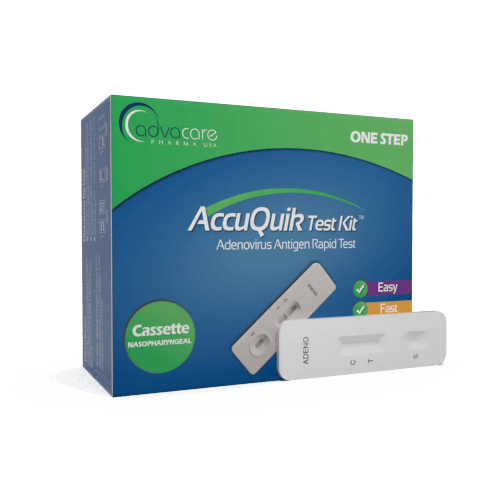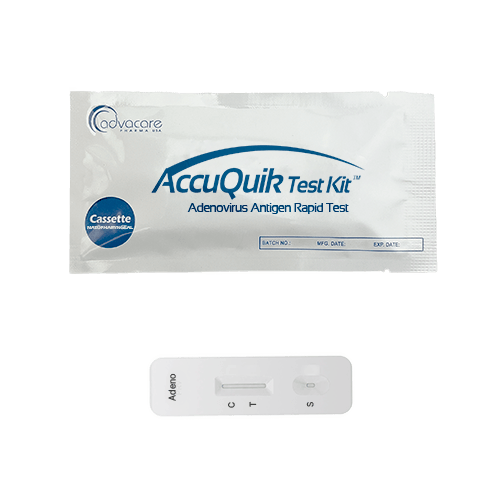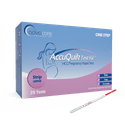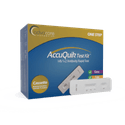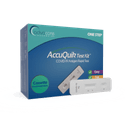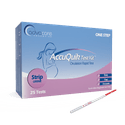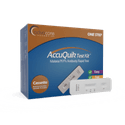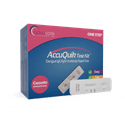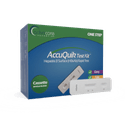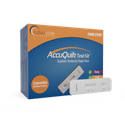- Home›
- Medical Devices›
- Diagnostic Detection Devices›
- Rapid Test Kits (RDT)›
- Adenovirus Antigen Test Kit
Adenovirus Antigen Test Kit
Specimen
Form
Packaging
What is an Adenovirus Antigen Test Kit?
An Adenovirus Antigen Test Kit is a medical diagnostic tool used to detect adenovirus antigens in nasopharyngeal or fecal samples. The family of adenoviruses may cause respiratory infections, conjunctivitis, gastroenteritis, and some neurological illnesses. Early pathogen detection is essential for infection control.
Rapid adenovirus test kits are often quicker or more affordable than other viral detection diagnostic tools, such as PCR tests. This medical testing tool can be used as a point-of-care test, which can be performed outside of a laboratory. This makes it a valuable tool for infectious disease testing and quick testing in settings such as hospitals, clinics, health centers, and schools. Because they are usually less accurate and show a false negative, a positive test result should be followed up with a PCR test or other sensitive diagnostic test.
This antigen detection kit is an immunoassay test, which contains specific antibodies that will bind with adenovirus antigens present in the sample. This reaction produces color change or other visual signals that indicate the presence of the virus. This rapid diagnostic test kit is available as either a test cassette containing a test strip or as a test strip.
AdvaCare Pharma is an ISO/CE-certified exporter and manufacturer of Adenovirus Antigen Test Kits. This product has been manufactured in strategically-located facilities situated in India, China, and the USA. Every factory undergoes regular inspections to ensure that they comply with healthcare standards regarding quality and safety.
Product Specifications
Specimen
Form
Nasopharyngeal Swab
Nasopharyngeal Swab is used to gather a small number of cells from the nasopharynx, upper nose, and throat. This swab features a long and thin plastic handle, with a tip that can readily absorb fluid samples from the nasopharynx.
Nasopharyngeal swabs come in a sterile blister pack, and after sample collection, they are immediately placed in a buffer dilution to facilitate the testing process.
Fecal Swab
Fecal Swab is used to collect a sample of cells from a patient's stool sample. The instrument features a long, thin part and a tip at the end that is inserted into the stool sample and rotated to ensure that the entire tip area of the swab is in contact with the sample.
Fecal swabs are provided in a sterile blister pack, and after collecting the sample, it is placed in a buffer dilution to proceed with the test.
Cassette
Cassette device is a plastic box that encloses a test strip. The box features an area designated for sample placement and a window to read the test strip results that appear as either positive, negative, or invalid.
The test strip inside of the cassette utilizes an immunochromatographic assay and is used for the qualitative detection of the adenovirus antigens in the human nasopharynx or fecal swab specimens.

Strip
Strip is a narrow piece of plastic that contains reactive agents. It features an area for sample application and an area in which the test results are displayed.
The strip features an immunochromatographic assay-based test, or a lateral flow assay, that is used for the qualitative detection of adenovirus antigens in human nasopharynx or fecal specimens.

Why choose us as your Adenovirus Antigen Test Kit manufacturer?
AdvaCare Pharma is a globally recognized manufacturer of Adenovirus Antigen Test Kits. This rapid test kit is part of our AccuQuik™ branded line of diagnostic detection devices, all manufactured by CE and ISO facilities. A STED dossier accompanies them, providing confidence to our partners and distributors that our medical instruments meet the highest standards.
For over two decades, AdvaCare Pharma has focused on delivering high-quality, cost-effective pharmaceutical products and market-specific solutions for our global partners. We stand out from other large-scale global distribution companies by implementing a vested supplier-distributor relationship. Currently, our distribution network spans 65 markets worldwide.
Uses
How should Adenovirus Antigen Test Kits be used?
The process begins with the collection of samples from the patient, through nasopharyngeal or fecal swabs provided in the kit. These swabs are carefully inserted into the respective areas to collect cellular material containing potential adenovirus antigens.
Following sample collection, healthcare professionals or individuals administering the test must meticulously adhere to the provided instructions for transferring the swab into the buffer solution. This step guarantees proper preservation of the collected sample for accurate testing.
Once the swab is placed in the buffer solution, a small amount of this solution is then applied to the designated area on the test cassette or strip.
The user must wait for the predetermined amount of time, typically indicated in the packaging instructions, allowing the test to develop and display results.
After the specified waiting period, the results are interpreted based on the appearance of control and test lines on the test cassette or strip.
Any damaged adenovirus test kits or kits past their expiration date should be promptly discarded to maintain the accuracy and reliability of test results. Furthermore, all materials used in the testing process, including used swabs and test components, should be disposed of in accordance with local regulations to prevent potential contamination and secure proper hygiene standards.
How are Adenovirus Antigen Test Kits stored?
Adenovirus antigen rapid tests must be stored under specific conditions to preserve their effectiveness and accuracy. These kits should be kept at room temperature, ideally between 2-30°C, in a controlled environment that is shielded from direct exposure to light and moisture. Extremes of temperature or humidity can compromise the integrity of the test components and adversely affect the validity of test results. Therefore, it is imperative to store the kits in a stable environment that meets these recommended temperature and humidity ranges to establish a good performance and reliability when conducting tests.
How are used medical testing kits disposed of?
The disposal of used medical testing kits, including adenovirus antigen test kits, is an important aspect of infection control and waste management practices. Following the completion of testing procedures, used test kits should be disposed of in accordance with local regulations governing the handling and disposal of medical waste. Typically, it is recommended to place the used test kits, along with any associated materials such as swabs and packaging, into a designated biohazard bag. This bag should then be securely sealed to prevent any potential leakage or contamination. The exterior of the biohazard bag should be disinfected, and the bag should be deposited into the appropriate medical waste disposal container. Adhering to these disposal protocols helps mitigate the risk of spreading infections and maintains a safe and hygienic testing environment.
How are Adenovirus Antigen Test Kits used in hospitals?
In hospital settings, Adenovirus antigen test kits serve as valuable tools for rapid screening and diagnosis of adenovirus infections among patients. Healthcare professionals rely on these kits to swiftly identify individuals who may be infected with adenovirus, facilitating prompt isolation and appropriate medical intervention. By effectively detecting adenovirus antigens in nasopharyngeal or fecal samples, these test kits aid in implementing infection control measures within hospital environments, thereby minimizing the risk of transmission and guaranteeing the safety of both patients and healthcare personnel.
How do Adenovirus Antigen Test Kits contribute to public health initiatives?
Adenovirus antigen test kits have a significant impact on public health initiatives by enabling rapid and widespread screening for adenovirus infections within communities. These test kits offer a valuable tool for identifying and isolating individuals who may be carrying the virus, thus helping to contain outbreaks and prevent the further spread of infection. By promptly detecting adenovirus antigens in nasopharyngeal or fecal samples, these kits support public health authorities in implementing targeted interventions, such as quarantine measures and vaccination campaigns, to mitigate the impact of adenovirus outbreaks and safeguard community health.
How are Adenovirus Antigen Test Kits utilized in community health centers and primary care facilities?
Community health centers and primary care facilities rely on Adenovirus antigen test kits to support early detection and management of adenovirus infections among patients seeking medical care. These test kits enable healthcare providers to promptly assess individuals presenting with symptoms suggestive of adenovirus infection, such as respiratory or gastrointestinal symptoms. By conducting rapid antigen testing using nasopharyngeal or fecal samples, healthcare professionals can initiate appropriate treatment and implement infection control measures to prevent the spread of the virus within the community. Furthermore, the availability of on-site testing with Adenovirus antigen test kits enhances the efficiency of diagnostic processes in community healthcare settings, facilitating timely patient management and reducing the burden on centralized laboratory facilities.
FAQs
How does an Adenovirus Antigen Test Kit work?
The adenovirus test kit is an immunoassay test, which works by detecting the presence of antigens that are specific to the adenovirus. The test strip uses specific antibodies that will bind the antigens that are present in a patient's sample.
How long does it take to get the results of an Adenovirus Antigen Test Kit?
A rapid adenovirus antigen test typically delivers results within 15-20 minutes.
Which patients should be tested with an Adenovirus Antigen Test Kit?
It is recommended to test patients who are displaying typical symptoms caused by an adenovirus infection, such as fever, sore throat, or cough. The adenovirus is also a leading cause of acute diarrhea in children. It is best to test a patient within a week of the onset of their symptoms.
When should a nasopharyngeal swab or fecal swab be used?
Nasopharyngeal swabs should be used for respiratory infections or when respiratory symptoms are present. Fecal swabs are used when there is diarrhea or other gastrointestinal symptoms present.
Can Adenovirus Antigen Test Kits be used for screening purposes?
Rapid diagnostic tests are best used as a screening tool for patients exhibiting infectious symptoms. An adenovirus antigen test kit may not be suitable for asymptomatic patients.
What are the benefits of using a strip or a cassette?
Both strips and cassettes are convenient and easy to use. In general, test strips are simpler to use and can be performed with minimal training. They typically require less sample volume, as well. Cassette tests may require a larger sample and thus can display a higher level of sensitivity. This makes them often a better option for laboratory-based testing or when a high volume of testing needs to occur.
Is there flexibility in adjusting the packaging of your branded medical devices to suit my market requirements?
Yes, our standardized packaging can be adjusted for purposes of regulatory compliance and market preference. However, some product packaging of medical devices may have limited options as maintaining product integrity is of paramount importance.
Is it challenging to import Class II medical devices for distribution?
Importing Class II medical devices may require navigating more stringent regulatory requirements, yet with proper documentation and compliance, it is feasible. Our Regulatory Affairs Department supports distributors in efficiently registering Class II devices in their target markets.
Are your Adenovirus Test Kits suitable for sale to medical institutions?
Our medical devices are suitable for distribution in labs, hospitals, clinics, pharmacies and other healthcare facilities, where they can be used to provide high-quality patient care. Our efficient distributor verification process makes it easy to get started. Contact our International Sales Department for more information about the distribution of our medical devices in your market.

You might be interested in...
Why AdvaCare Pharma?
As an industry leader, we are aware of our responsibility to provide affordable and sustainable solutions to improve healthcare worldwide.
